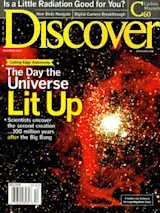Dear Dr. Pinker . . . I am writing in response to Steven Pinker's "The Blank Slate" [October]. As a 32-year-old adoptee, I can vouch that you do inherit your personality from your birth parents. I was raised in an ideal home by wonderful people, yet I am nothing like them when it comes to personality. As a matter of fact, that's where we clashed the most. At the age of 30, I finally had the opportunity to be reunited with my birth parents. What a shocker! I was the replica of my birth father in every way except gender. I finally got to see where I got my looks, sense of humor, lack of patience, and mannerisms. This surprised me, as I had always assumed I took after my birth mother. Thank you for confirming what my birth father and I have discussed for the last two years: It's ...
Letters: December 2002
Letters from the December 2002 issue.
More on Discover
Stay Curious
SubscribeTo The Magazine
Save up to 40% off the cover price when you subscribe to Discover magazine.
Subscribe













